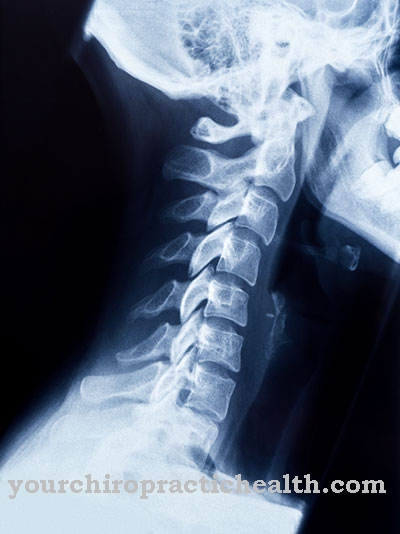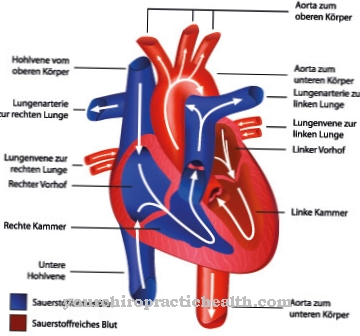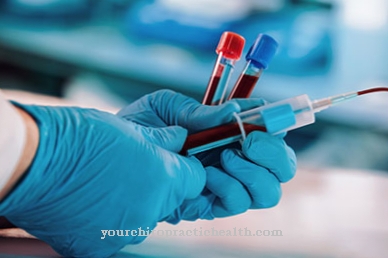In the Capsular contracture it is a complication that can occur with breast enlargement. A hard tissue capsule forms around the breast implant as a result of the body's natural but excessive immune reaction. The risk of capsular contracture can be significantly reduced through improved implants and gentler surgical techniques.
What is capsular contracture?

A Capsular contracture refers to the formation of a hard shell that encloses a breast implant. It consists of a layer of connective tissue that is formed around every foreign body in human tissue in the course of normal immune defense.
If this layer thickens and hardens unnaturally, it can cause severe pain and hardening of the chest. Visible deformations can also occur. In addition, with capsular contracture there is a risk that the implant will tear.
causes
The cause of the emergence of a Capsular contracture is still unknown. The formation of a thin enveloping layer of connective tissue is a regular reaction of the body to foreign material.
This serves as a demarcation between healthy tissue and potentially harmful substances. Why this connective tissue layer in some cases loses its elasticity and increases in thickness has not yet been established. However, there seem to be some factors that promote the development of capsular contracture.
This includes the use of smooth-walled breast implants, in which capsular contracture occurs in up to 30 percent of cases after breast augmentation. The type of surgery also seems to have an impact. Capsular contractures occur much more frequently when the implant is placed above the pectoral muscle than when it is placed in a pocket under the pectoral muscle.
Symptoms, ailments & signs
Capsular contracture can be almost symptom-free. Most of the time, however, the disease causes severe pain and visible changes in the chest area. In the first stage of the disease, the breast is only slightly hardened and there are usually no symptoms or discomfort. Those affected occasionally feel a slight discomfort, which, however, usually subsides again.
In the second stage, capsular contracture causes a noticeable feeling of tension in the chest, which is accompanied by pain and increasing discomfort. In the third stage, the hardening can be determined externally. The feeling of tension increases and the pain intensifies. In addition, circulatory disorders and overheating of the chest can occur at this stage.
In the fourth and final stage, the breast has already become severely deformed and is extremely sensitive to touch. The hardening can be ascertained externally. In addition, inflammations can develop, which intensify the symptoms and often lead to fever. The symptoms can lead to secondary symptoms such as sleep problems or mental problems. As a result, those affected are often irritable, tired or in a bad mood. The symptoms of capsular contracture develop gradually and subside with early treatment.
Diagnosis & course
A Capsular contracture can go almost unnoticed, but can also lead to severe pain and visible changes in the chest. There are four stages of capsular contracture.
At level 1, the breast is only very slightly hardened and there are no or only extremely slight symptoms. Diagnosis is made by palpation and ultrasound.
This also applies to stage two, at which the capsular contracture can already cause slight pain and a feeling of tension in the chest. At stage 3, capsular contracture can already be diagnosed by external appearances, as the hardening of the connective tissue sheath leads to visible changes in the breast.
In addition, severe pain can occur. When a capsular contracture reaches level 4, the entire breast is hard, deformed, and extremely sensitive to touch. Whether the capsular contracture is related to the silicone disease after breast implants has not yet been scientifically clarified.
Complications
Capsular contracture mainly occurs when the patient has her breast enlarged. This can lead to various complications and complaints after the operation. Most of those affected suffer from severe pain that occurs in the chest. This pain can spread to other regions of the body.
Quite often, pain at rest at night leads to sleep problems and can thus significantly reduce the patient's quality of life. The breasts are also tense. The implants themselves often slip, which can also lead to aesthetic complaints. Many of those affected also suffer from reduced self-esteem and are ashamed of the appearance of their breasts.
These often appear asymmetrical and have wrinkles. The treatment of capsular contracture is usually symptomatic. If there is only pain, it can be limited with the help of medication. Possible inflammation is also limited with the help of medication.
If the symptoms are severe or lead to greatly reduced optics, further surgical interventions are necessary in most cases. There are usually no complications. The capsular contracture does not lead to a reduction in life expectancy.
When should you go to the doctor?
Women who have undergone breast augmentation should have their breast implants checked by a doctor at regular intervals. If abnormalities or peculiarities arise, a doctor's visit is necessary to clarify the circumstances. Particular caution is required if there is hardening in the immediate vicinity of the implant. Therefore, the breast should be scanned several times a month independently. As soon as lumps or swellings are noticed, a doctor should be seen immediately so that a diagnosis can be made via imaging tests.
If you have pain or a feeling of tension in your chest, you should see a doctor. If you notice irregularities in turning or moving, a doctor should be informed. The pain indicates a discrepancy that should be clarified urgently. Sudden and incomprehensible deformations of the breast or a displacement of the implant are warning signs that must be checked by a doctor. A feeling of twisting or palpable structural changes in the implant must be clarified by a specialist.
As there can be serious health consequences if the implant is damaged, a doctor should be consulted as soon as possible. Wrinkles on the chest are also considered unusual and should be examined more closely. If the symptoms continue to intensify, a doctor is required.
Treatment & Therapy
A Capsular contracture stage 1 is usually not in need of treatment. If pain occurs, drug therapy with anti-inflammatory agents can be prescribed.
In the case of milder complaints, massages or an ultrasound treatment can also provide relief. From level 3, surgical treatment is essential for capsular contracture.
Depending on the degree of severity, loosening, rupturing or removal of the connective tissue capsule come into question. If the capsular contracture is very advanced, it may be necessary to remove the entire breast implant.
Outlook & forecast
In the case of capsular contracture, medical treatment is not absolutely necessary. Rather, it usually heals without complications and can be promoted by hot baths and massages. This stimulates the blood circulation and thus promotes the body's self-healing.
If there is no improvement or pain occurs after a few days, a medical consultation is essential. Depending on the severity, he can advise acupuncture or treatment measures from the field of Chinese medicine and support this with anti-inflammatory and pain-relieving medication. In the worst case, however, surgical capsule removal is necessary. Whether this is actually necessary in individual cases depends on the pain of the person concerned.
Those affected should inform the doctor of all medication they have taken before an operation in order to prevent possible interactions with anesthetic medication. After the procedure, restraint and meticulous personal hygiene are indicated in order to avoid complications such as wound healing disorders or infections. Under certain circumstances, a change in diet can even be helpful, with which the doctor, in cooperation with a nutritionist, will be happy to help. The body needs sufficient proteins, carbohydrates, fats, vitamins, minerals and trace elements to fight off pathogens and build up new skin. The better he is supplied with it, the more symptom-free wound healing will be. A good supply of oxygen with plenty of fresh air is also beneficial.
prevention
To one Capsular contracture To prevent this, you can take various measures. In particular, when choosing a breast implant, value should be placed on a coarsely textured surface, as this reduces the risk of capsular contracture to less than five percent.
Placing the implant under instead of over the chest muscle also significantly reduces the risk. Later capsular contracture can also be avoided with particularly gentle surgical techniques. These include avoiding contact between the implant and the skin, using drains during and after the operation, and rinsing the implant with antibiotics. This can be supported by continuing the antibiotic prophylaxis in the first few weeks after the operation.
During this time, a stable compression bra should also be worn, which ensures that the implant remains in the intended place and connects well with the surrounding tissue. With all of these precautions in place, capsular contracture is now very unlikely compared to previous breast implants.
Aftercare
With capsular contracture, in most cases there are no or only a few measures available for direct follow-up care. Therefore, those affected with this disease should consult a doctor very early to prevent the symptoms from worsening. As a rule, self-healing cannot occur.
An early diagnosis can usually always have a positive effect on the further course of the disease. Capsular contracture is usually treated by taking various drugs. The person affected should always ensure that they are taken regularly and that the dosage of the medication is correct. If anything is unclear or if you have any questions, a doctor should always be contacted first.
In severe cases, capsular contracture can also be treated with surgery. The patient should definitely rest after the procedure and take care of his body. Exertion or other physical and stressful activities should be avoided. The support and help of friends and family can also have a positive effect on the further course of the capsular contracture. Usually the disease does not reduce the life expectancy of the person affected.
You can do that yourself
Capsular contracture does not necessarily require medical treatment. Usually it does not cause any complications and in many cases it resolves on its own. However, if pain occurs, a medical evaluation is indicated.
The patient can support the medical therapy through various self-help measures. Massages or hot baths, for example, have proven effective. In consultation with the doctor, alternative treatment methods such as acupuncture can be tried. Chinese medicine also offers alternative measures that can dissolve capsular contracture. In the case of major complaints, the hardening must be operated on. After an operation, bed rest and rest apply first. The affected person may also have to change their diet in order to ensure symptom-free healing of the surgical wound.
In addition, close medical supervision is indicated. Various complications can arise that must be treated at an early stage, especially after the removal of very advanced capsular contractures. The person concerned must also ensure adequate personal hygiene in order to avoid wound healing disorders, infections and similar complaints. If, despite these measures, signs of a severe course or serious complications become noticeable, the doctor must be spoken to as soon as possible.

.jpg)


.jpg)






















